home / Best Course Platforms /Kajabi Review
We earn a commission from partner links on this site. This doesn’t affect our opinions or evaluations.
Facebook Groups have witnessed remarkable growth in recent years. This expansion has been driven by continuous feature enhancements and growing enthusiasm for digital community spaces.
These community hubs have emerged as essential components in fulfilling Facebook’s core mission “to bring the world closer together.” The functionality has achieved such significant success that currently 1.8 billion individuals engage across tens of millions of distinct communities every month.
If you’re seeking comprehensive statistics and insights about Facebook Groups to deepen your understanding of this digital phenomenon, you’ve arrived at the ideal resource.
This analysis presents the 12 most significant metrics regarding Facebook Groups, encompassing usage patterns, highest-performing communities, emerging trends, and critical engagement indicators.
Let’s begin our exploration.
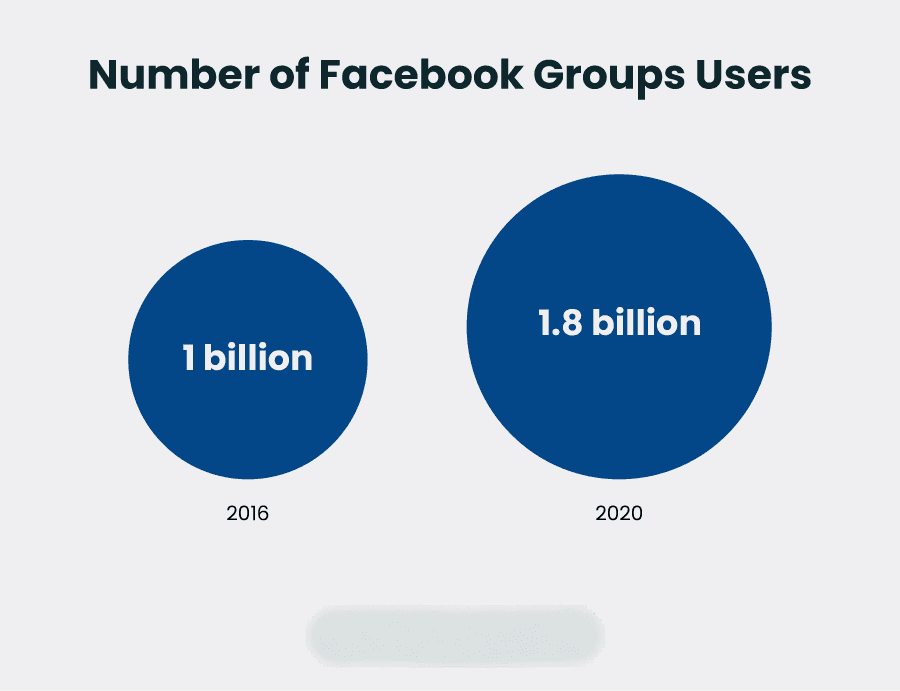
Facebook initiated substantial investment and strategic focus on group functionality throughout 2019, significantly accelerating adoption rates.
Additionally, pandemic lockdown periods drove increased user participation as individuals sought digital connection alternatives. This growth pattern aligns with research from NYU’s The GovLab indicating users experience heightened community belonging through group participation.
To sustain membership growth, Facebook continues developing enhanced features, including premium subscription subgroups, integrated community messaging, and expanded administrative capabilities.
Facebook implemented a comprehensive interface redesign prioritizing group content over individual connections. This strategic shift, combined with enhanced recommendation algorithms, encouraged broader group participation and increased engagement.
As a result, membership in groups categorized as “meaningful” by users expanded from 100 million in 2017 to 400 million in 2019. Furthermore, approximately 100 million individuals participated in communities they classified as “very meaningful.”
While the platform maintains discretion regarding specific engagement metrics, these figures derive from comprehensive user surveys and behavioral analysis.
Users increasingly participate in multiple online communities, developing deeper connections across digital spaces, with half of all users maintaining membership in five or more distinct groups.
This membership diversification trend partially reflects traditional offline organizations establishing complementary digital presences.
Research confirms this integration of physical and digital community spaces, with 77% of survey respondents indicating their most valued community now maintains an active online component.
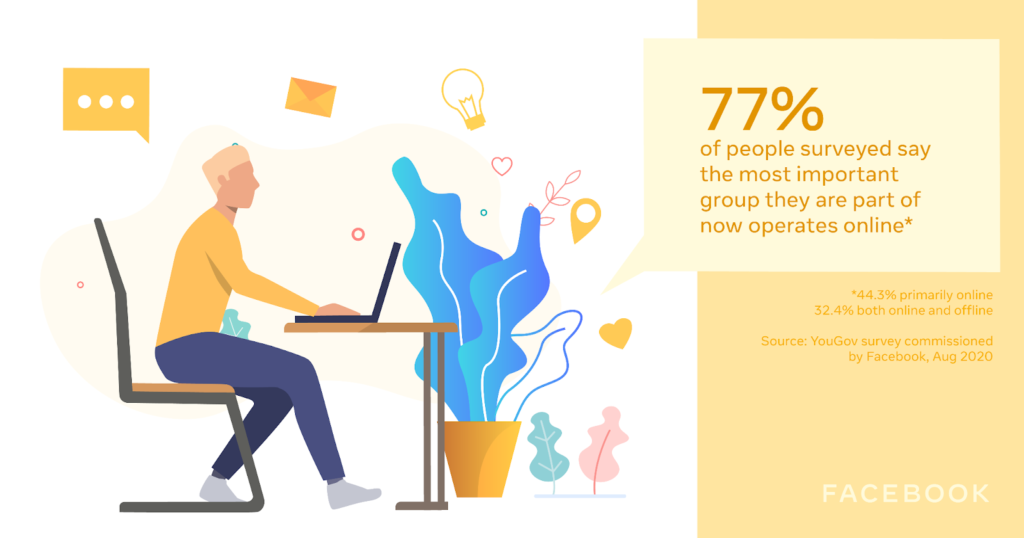
This expansion of digital communities has been intensified by the widespread movement of individuals, commercial entities, and traditional community organizations establishing comprehensive online presences.
According to official corporate communications, Facebook has deliberately prioritized group functionality through feature enhancements, interface redesigns, and sophisticated recommendation systems to capitalize on this emerging digital behavior pattern.
Following these strategic platform modifications, Facebook Groups have experienced substantial engagement growth, accompanied by the formation of millions of additional community spaces.
The platform currently hosts tens of millions of distinct groups encompassing virtually every conceivable interest area and specialized niche. Notable community examples include Girls Love Travel, English Speaking 101, and Motivational Quotes.
Without effective social media moderation, group environments frequently deteriorate into conflict, inappropriate content, misinformation dissemination, and ultimately community dysfunction.
This reality underscores the critical importance of community management. To address these governance requirements, existing community participants are typically selected or formally nominated for administrative and moderation responsibilities.
Currently, 70 million administrators and moderators serve as community stewards across Facebook Groups, performing essential functions in establishing and sustaining vibrant community ecosystems.
Recent Facebook research indicates that 58% of survey participants identify effective leadership as among the most crucial elements contributing to successful community development.
Facebook Groups foster a sense of connection and inclusion for 98% of participants. These digital spaces cultivate belonging by providing structured environments for discussing significant topics and shared concerns.
Facebook highlights Female IN as an illustrative example. This community addresses women’s issues throughout Nigeria, covering relationship guidance, health concerns, abuse prevention, and grief management.
These platforms facilitate challenging conversations within supportive digital environments. Research conducted by Facebook reveals that users primarily join these communities seeking emotional support, community belonging, and protected discussion spaces.
The ten largest Facebook communities collectively comprise over 45 million members, with each prominent group organized around substantial interest categories or passionate enthusiasts.
Makeup Artists exemplifies passion-centered communities, attracting over 4.6 million participants. This specialized group focuses exclusively on advanced makeup application techniques and skill development.
Currently, Deepika Sharma holds the position of Facebook’s most populous group with an impressive 7.9 million members. This community primarily features humorous video content, internet memes, and various entertainment materials.
| Group Name | Number of Members (In Millions) |
|---|---|
| Deepika Sharma | 7.9 |
| Our Evergreen Bangladesh | 6.2 |
| Cheap Meal Ideas | 5.0 |
| Makeup Artists | 4.6 |
| Kersh Keepers Official Group | 4.5 |
| Netflix Recommendations | 4.5 |
| PRAY UNTIL SOMETHING HAPPENS! [PUSH]! | 3.9 |
| View From My Window | 3.6 |
| Math Formulas | 3.3 |
| Instant Pot Community | 3.2 |
Community builders flock to this platform because Facebook Groups consistently deliver remarkable interaction levels. Engagement rate measures the combined total of posts, reactions, and comments within a group during a specific timeframe.
What constitutes a good engagement benchmark fluctuates based on group size, content style, and member characteristics. Most thriving groups achieve a minimum engagement rate of 80%, while exceptional communities can witness engagement figures surpassing 200%.
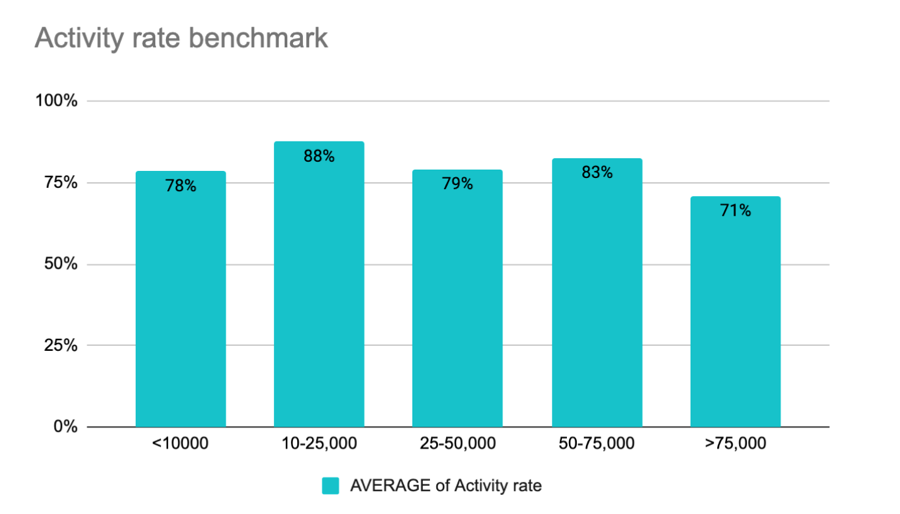
A key factor driving these impressive engagement statistics is that typical users dedicate approximately 33 minutes daily to Facebook, allowing community members to participate without disrupting their established routines.
Group notifications and content naturally appear in members’ content streams, enabling them to interact with the community during their regular browsing sessions. Implementing Facebook Group welcome messages represents another effective strategy to foster engagement from the beginning.
When contrasted with proprietary platforms or websites, content creators typically experience substantially higher interaction rates within the Facebook ecosystem.
Building vibrant online communities stands as a dominant trend in the creator economy. Facebook has emerged as the preferred destination for hosting communities, with 74% of community builders choosing to leverage the Groups functionality.
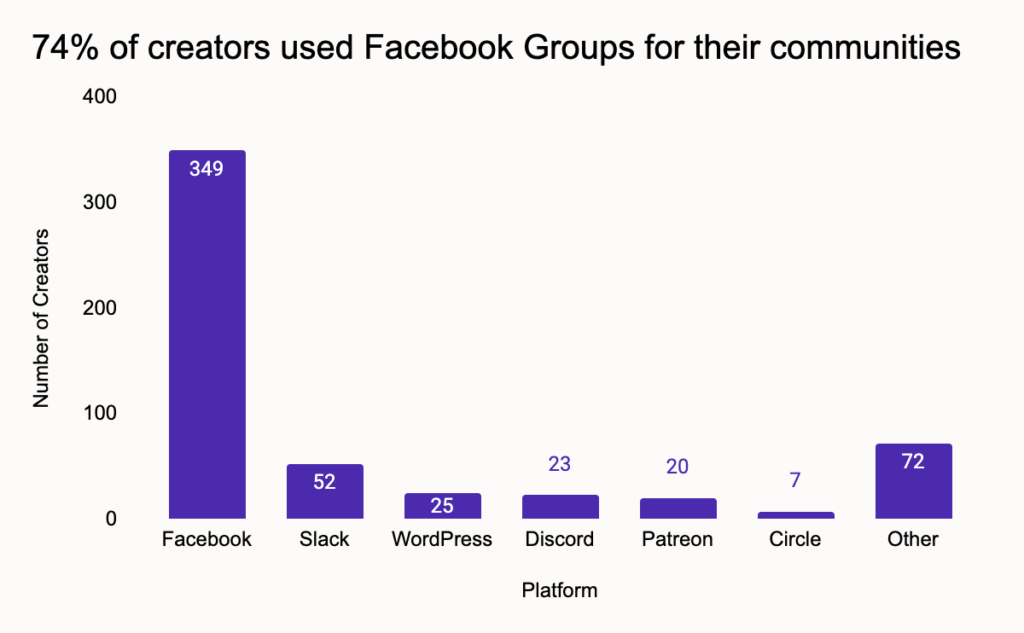
The primary motivation creators reported for selecting Groups was that the “platform integrates seamlessly with my other creator activities.”
Content creators were already utilizing Facebook for various aspects of their work, enabling effortless transitions and smooth workflow integration.
The extensive user community, paired with the platform’s robust Groups capabilities, ranked as the second and third most frequently mentioned reasons creators gravitate toward the platform.
Facebook boasts over 2.5 billion monthly active users and operates in 156 countries, establishing it as the most expansive social media ecosystem. Creators can invite and nurture communities without requiring members to create new accounts, as most individuals already maintain profiles.
Video significance has expanded dramatically due to shifts in consumer preferences. Currently, users devote more than six hours daily watching videos across television screens, computers, and video-centric applications.
When compared to standard video content, Facebook research indicates that Live broadcasts generate six times greater audience engagement, making them invaluable tools for community administrators.
Digital interactions between creators and community members prove fundamental to developing robust communities. A widely adopted approach for creators to engage with their audience involves hosting live broadcasts within their group.
Popular live content formats include interactive question-and-answer sessions, informational presentations, and practical demonstrations.
Beyond enhancing audience connection, live videos also boost activity metrics and engagement statistics. These represent two crucial indicators that Facebook evaluates when recommending groups to potential new members.
When establishing online communities, founders must ensure mobile compatibility, considering that 55% of social media engagement occurs on portable devices.
Facebook maintains an unwavering commitment to mobile users, continuously enhancing and expanding the in-app experience. This dedication has yielded impressive results, as 81.8% of Facebook users now exclusively interact with the platform via mobile devices.
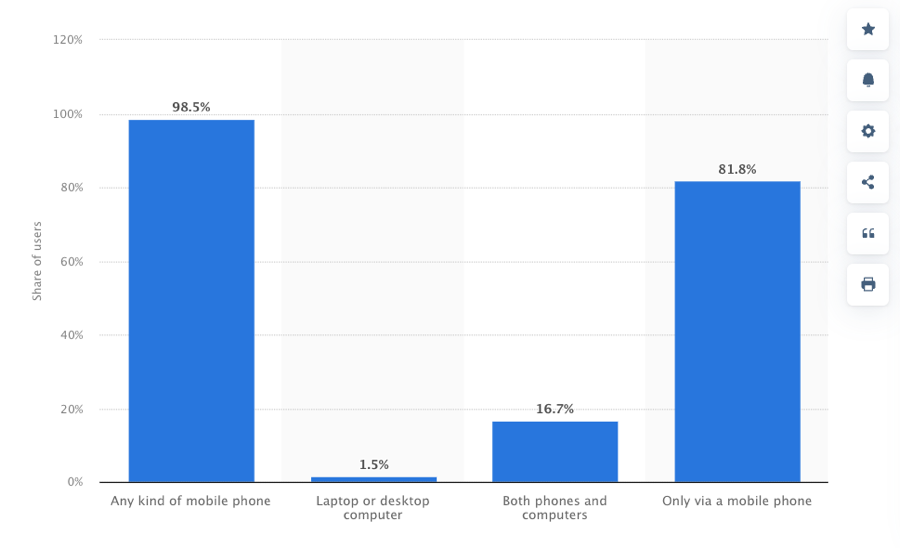
When individuals join a community, alerts automatically appear on members’ devices, encouraging participation. These built-in notification systems significantly enhance engagement levels and inter-member communication.
A striking 88% of creators currently using FB Groups express desire to transition to different platforms. In contrast, merely 3.44% of creators intend to continue utilizing Facebook as their community hub.
Content creators are exploring Facebook Group alternatives for numerous reasons. The increasing anti-Facebook sentiment appears to be the predominant factor, though creator feedback also mentions algorithm frustrations, platform distractions, and insufficient feature offerings.
The 88% figure seems remarkably high, though it’s worth noting that Podia conducted this research with a specific demographic, primarily consisting of online course developers.
In 2025, Facebook Groups continue to dominate as the premier solution for community development. Nevertheless, given the substantial creator dissatisfaction and community ambivalence, ongoing monitoring of this trend remains crucial.
If you currently manage an established group and wish to generate revenue, explore our comprehensive guide on monetizing a Facebook group.
This completes our comprehensive analysis of the twelve most significant Facebook Group statistics in 2025.
Should you have questions or believe we overlooked important information, please share your thoughts in the comments section below!
Facebook Groups is used by 1.8 billion monthly active users. Moreover, 50% of Facebook users are members of five or more groups.
The number of groups available to Facebook users has soared to tens of millions. The most popular groups are focused on a niche or passion and have millions of monthly active users. Top groups include Netflix Recommendations, Maths Formulas, Makeup Artists, and Cheap Meal Ideas.
As of 2022, the largest Facebook Group is Deepika Sharma, with 7.9 million members. The group posts funny videos, memes, and photos.
All top groups have an engagement rate of above 80%. Engagements include reactions, posts, and comments. As the group grows, the expected engagement rate drops.

Daniel NicFounder, SellingOnliceCoursesGuide.comis an entrepreneur and digital education specialist who founded sellingonlinecoursesguide.com, a platform dedicated to helping creators and educators successfully navigate the online course marketplace. Through his website, he shares insights and strategies for developing, marketing, and monetizing online educational content. His work focuses on empowering course creators to build sustainable online businesses while effectively sharing their knowledge with students worldwide.

Daniel Nic is an entrepreneur and digital education specialist who founded sellingonlinecoursesguide.com, a platform dedicated to helping creators and educators successfully navigate the online course marketplace. Through his website, he shares insights and strategies for developing, marketing, and monetizing online educational content. His work focuses on empowering course creators to build sustainable online businesses while effectively sharing their knowledge with students worldwide.

We respect your privacy and will never spam you.